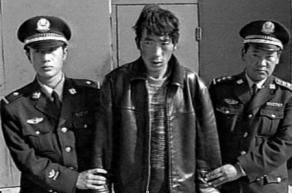On January 23, 1751 Lhasa … witnessed another horrible example of Chinese justice. Lobsang Trashi and six other leaders of the rebellion were executed by cutting them into pieces. Other people were beheaded or strangled. The heads of the executed were mounted on spikes. The other leaders were exiled and stripped of their property.
–Luciano Petech, China and Tibet in the Early XVIIIth Century
China’s domination of Tibet, dating to 1720, has generated resistance, intermittently violent, down to the present day.
The incident at hand here was a November 1750 Lhasa riot sparked by the assassination of Tibet’s prince by China’s plenipotentiary, who had caught wind of the local ruler’s intention to detach his kingdom from Qing domination.
The royal chamberlain, Lobsang Trashi (German Wikipedia entry | Dutch) managed to escape the scene and found himself at the head of a furious rabble that sacked the Qing embassy, looted a treasury, and killed dozens of Chinese soldiers — and dozens more Chinese civilians.
But the popular furor burned itself out within days, most Tibetan elites sagely declining to get involved in the pogrom pending the likely — and soon, actual — overwhelming Qing response. These guys got the fire-eaters arrested (they’d be handed over to the arriving Chinese army) and installed the Dalai Lama as the new secular as well as religious authority.
On this day..
- 1952: Võ Thị Sáu
- 1945: Angelo Chiappe
- 1874: Marshall Martin, "an innocent man compared to that woman"
- 1639: The auto de fe of Lima, Peru
- 1888: Danny Driscoll, Whyo
- 1348: The Duke of Durazzo, all in the family
- 1985: Vladimir Vetrov, Farewell
- 1892: Patrick Boyle, bindle bandit
- 1996: Richard Townes, Jr.
- 1685: Robert Pollack and Robert Millar, Covenanters
- 1903: Arthur Alfred Lynch condemned
- 1945: Nikolaus Gross, Catholic anti-Nazi labor activist

